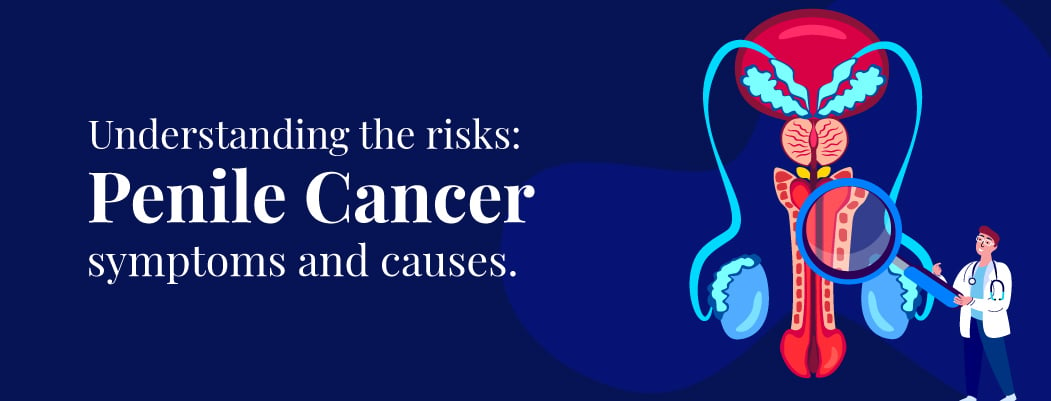Penile cancer: Symptoms and Causes
December 22, 2022

Malignant cells in the penis grow out of control to cause penile cancer. The penis is a rod-shaped reproductive organ that enables men to urinate and engage in sexual activity. The head, also known as the glans, is composed primarily of the rod-like portion (shaft) that runs from the low belly to the tip of the penis. The foreskin, or top layer of skin, covers the head in people who have not been circumcised. The head of your penis is visible if you haven’t been circumcised.
Contents
Although cancer can develop anywhere in the penis, it typically begins on the head or foreskin (if you are an uncircumcised person).
What are the different types of penile cancer?
Squamous cell carcinoma makes up 95% of penile malignancies (SCC). The epithelium, the top layer of your skin, is where this type of cancer develops. Penile cancer can develop in various tissue types in less prevalent, alternative forms.
- Basal cell carcinoma (BCC): Cancer begins in the epithelium’s bottom layer. Penile cancer with a slow growth rate is known as BCC.
- Melanoma: This cancer starts in melanocytes, cells that determine how dark or light your skin is. The malignant melanoma is more dangerous.
- Sarcoma: Cancerous growths in connective or muscle tissue. It is a very rare type of penile cancer.
Penile Cancer Causes and Risk Factors
Experts are unsure of what causes penile cancer. According to research, it is more common in men who:
- Have the papillomavirus (HPV).
- Are over the age of 60.
- Smoke.
- Have a weakened immune system as a result of HIV or AIDS.
- Have phimosis, a disorder that causes tight, difficult-to-clean foreskin. Additionally, fluid accumulation may result.
What are the symptoms of penile cancer?
Penile cancer typically alters the appearance of your penis, though not all malignancies result in visible changes. You might see a bulge and discolored skin on your penis.
Penile cancer symptoms and signs include
- An unhurried lump or soreness (that may bleed)
- Swelling and itching, particularly in the penis’s head (balanitis)
- Skin becoming thicker or changing color
- Flat, blueish-brown-looking growths.
- Fluid beneath your foreskin that has a foul odor.
- Little crusty lumps
- Rash
Less serious illnesses might also bring these symptoms, including infections and allergic responses.
Also Read: An Introduction About Cancer And Its Treatment
How is penile cancer diagnosed?
Your doctor could run the following tests to see if you have cancer:
Physical examination and medical history: During the physical examination, your doctor will look for unusual skin changes, such as a lump or discolouration on your penis. Additionally, they’ll enquire about your routines, past illnesses, and symptoms. Your doctor can use this information to decide whether the changes are most likely caused by cancer or a less serious condition like an infection or an allergic response.
Biopsy: Only a biopsy can definitively diagnose cancer. Your doctor takes out any suspicious-looking cells or tissues throughout the process. A pathologist, a specialist who works in a lab, examines the cells under a microscope to look for indications of malignancy.
Imaging: Imaging may be required to determine how far cancer has spread. Your doctor may request a CT scan, MRI, ultrasound, PET scan, or chest X-ray, depending on your cancer type.
Treatment for penile cancer
Your course of treatment will be determined depending on the size of the tumor, whether it has spread, and how likely it is that the cancer will come back (recur) after treatment. A care team that includes your primary doctor, an oncologist, a urologist, and a skin specialist may be involved in your treatment (dermatologist).
Early-stage cancer patients may receive the following treatments:
- A cream-based treatment for your skin
- The cancerous tissue is frozen and destroyed by using a very cold liquid or instrument known as cryotherapy.
- In Mohs surgery, the damaged skin is removed one layer at a time until it reaches healthy tissue.
- Using lasers to cut and remove cancerous tissue
- Circumcision or foreskin removal procedure. If you had cancer in your foreskin, you would undergo this treatment.
You might also have the following if your cancer is more advanced or more prone to spread:
- If your cancer has gone to your groin, you may need surgery to remove some or all of the lymph nodes.
- Radiation and/or chemotherapy to remove cancer cells from your body
- A penectomy is a procedure in which your penis is partially or completely removed.
- Most early-stage penile cancer therapies have no effect on your ability to have sex, although chemotherapy and radiation may. Consult with your doctor about possible side effects.
(Consult with your oncologist, they will guide you and prescribe the right kind of treatment)
Prevention of Penile Cancer
Cancer cannot be entirely avoided, although certain factors can reduce your risk:
- Get yourself circumcised. Maintaining cleanliness in the area is simpler when you don’t have a foreskin.
- If you have a foreskin, be sure to clean it well.
- Avoid using tobacco.
- To prevent contracting HIV and HPV, practise safe sex.
How should I care for myself?
Discuss with your doctor how your cancer and treatment options may affect your way of life. The penile tissue is preserved in several cancer therapies. In other words, your penis eventually recovers to resemble its pre-treatment appearance almost exactly. Nevertheless, standing urination is still possible. Erections, intercourse, and orgasms are still possible. Your experience of sex and the way you urinate may be altered by surgery to remove all or a portion of your penis. There are numerous ways that penile cancer can manifest and be treated. You can better prepare for various potential events by knowing what to expect. Ask your doctors any questions you may have openly and honestly.
Who treats Penile Cancer?
An expert in utilising surgery to treat cancer is known as a surgical oncologist. Usually, urologists with additional training in cancer surgery are the surgical oncologists who treat penile cancer.
People also ask
1. Is penile cancer curable?
Penile cancer is more treatable if it’s found early and has not spread.
2. What is the survival rate of penile cancer?
About 80% of men with newly diagnosed penile cancer who have not yet disseminated the disease will survive for at least five years. The 5-year survival rate is 50% if cancer has progressed to the nearby tissues or organs and/or the local lymph nodes.
3. What is the main cause of penile cancer?
Human papillomavirus, a type of virus, is responsible for around half of all cases of penile cancer (HPV).
There are numerous forms of HPV, and some impact the genital region.
HPV can be acquired from
- Any genital skin-to-skin contact, including vaginal, anal, and oral sex, and the sharing of sex toys.
- Most HPV-affected individuals won’t get penile cancer.
4. At what age does penile cancer occur?
People over 55 are most frequently diagnosed with cancer, yet it can also affect those under 40. The average diagnostic age is 60.








